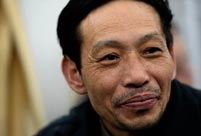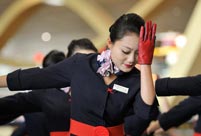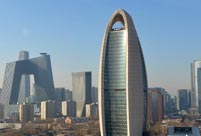 Int'l Snow Sculpture Art Expo in Harbin
Int'l Snow Sculpture Art Expo in Harbin Sichuan money wall for dividend payment
Sichuan money wall for dividend payment Li Na crashes Belinda Bencic in 2nd round at Australian Open
Li Na crashes Belinda Bencic in 2nd round at Australian Open
 Shocking moments when PLA's weapons open fire
Shocking moments when PLA's weapons open fire Famous Lanzhou beef noodles
Famous Lanzhou beef noodles Armed Police hold anti-terrorism drill in SE China's Xiamen
Armed Police hold anti-terrorism drill in SE China's Xiamen Harbin Int'l Ice and Snow Festival opens
Harbin Int'l Ice and Snow Festival opens 'Jin' named the word of the year by cross-strait netizens
'Jin' named the word of the year by cross-strait netizens Chinese scientific expedition goes to build new Antarctica station
Chinese scientific expedition goes to build new Antarctica station
BEIJING, Jan. 27 -- After five decades of ups and downs since China and France established diplomatic relations, the two countries are working to make their relationship more stable and predictable.
While meeting Speaker of the French National Assembly Claude Bartolone last week, Chinese President Xi Jinping said he hopes China and France will take advantage of the 50th anniversary celebration of diplomatic ties to open a new chapter in bilateral relations.
China and France should respect and trust each other, approach their relationship from a strategic and long-term perspective, and respect each other's core interests and major concerns to make the bilateral relationship even more stable and predictable, Xi said.
France was the first major Western power to establish official diplomatic relations with the People's Republic of China, which was founded in 1949.
Mao Zedong and Charles de Gaulle, two outstanding leaders of their times, decided to establish ambassador-level diplomatic ties in 1964, a groundbreaking move that overcame the siege of Cold War.
Fifty years on, bilateral ties have evolved into a comprehensive strategic partnership.
Bilateral trade hit 50 billion U.S. dollars in 2013, compared with 100 million U.S. dollars in 1964.
There were also downturns in the development of friendship following France's weapons sales to Taiwan in the late 1980s and early 1990s and Sarkozy's meeting with the Dalai Lama in Poland in 2008.
But the frictions were resolved by the 1994 French-Chinese joint communique and the joint press communique in 2009, in which France said it would prohibit French firms' involvement in arming Taiwan and that the country "refuses to support any form of 'Tibet independence'."
"Politically, China and France do not have fundamental divergence. (But) it's impossible for the two countries to agree on everything ...especially on issues related to internal management," said Qu Xing, head of the China Institute of International Studies.
NO NEED TO SWING
European studies researcher Zhang Jian believes France's vacillating poise at certain times was impacted by the international and domestic circumstances of the moment.
Along with China's rise, France's economy and society have faced difficulties under the shocks of financial crisis and the European debt crisis, which have negatively affected France's foreign diplomacy and led to decreased stability in its China policy, according to Wang Yi, former political counselor at the Chinese Embassy in France.
Wu Jianmin, former Chinese ambassador to France, stressed that certain twists and turns have never changed the trend of advancing bilateral relations.
He said economic competition between the two countries should not be a source of misunderstanding, as it is inevitable in times of globalization. "China has an advantage in labor force, but France owns so many world-class brands."
For Jacques Vanminden, chairman of the Amicale France Chine (Association for Friendship between France and China), France-China relations have not reached the ideal stage he expected.
France is over-cautious and worried about increasing trade and investment from China, which has given Italy and Germany opportunities to catch up, he said.
Experts believe that French President Francois Hollande has been adopting a more practical policy toward China.
Hollande visited China in April. He is the first leader of a major Western power to visit Beijing since China's new leadership took office.
In addition to the signing of an agreement for China to buy 60 Airbus planes and a number of deals in the nuclear energy industry, the two countries agreed to boost cooperation in sectors such as environmental protection, urban sustainable development and food safety during the French President's visit to China.
In December, French Prime Minister Jean-Marc Ayrault visited China, reaching agreements on a series of issues including deepening nuclear cooperation.
WHAT CAN BE DONE TOGETHER?
The 50th anniversary may be a new starting point for the two countries to achieve another "diplomatic nuclear explosion," said Qu.
China and France, both permanent members of the United Nations Security Council, have many common interests that should be jointly safeguarded.
Qu listed four common interests: anti-terrorism, nuclear non-proliferation, international stability, and unobstructed international waterways.
Qu said that China is predicted to import products worth 10 trillion yuan (about 1.6 trillion U.S. dollars) and invest 500 billion yuan overseas in the next five years, which will provide many opportunities to French companies.
The two countries have also begun cooperation in Africa-related fields. Vanminden said a China-France joint venture located in the southwest of the Paris Basin is exporting clean energy to Africa.
Wang Yi said that the two countries should abandon their differences in ideology and social systems, emphasize their common interests and respect each other's strategic and core benefits.
"China should value France's safety concerns over its peripheral regions such as Africa and the Middle East, while the French side should also understand and support China's policies on the South China Sea and its surrounding areas," Wang added.
As an important member of the European Union, France may make use of its position to create a new growth point for Sino-French ties.
Fifty years ago, France led other Western countries in setting up diplomatic ties with China, and now it should play a leading role in promoting a positive China policy within the EU, said Qu.
 A 60-hour journey home
A 60-hour journey home Int'l Snow Sculpture Art Expo
Int'l Snow Sculpture Art Expo Highlights of China's air force
Highlights of China's air force Airline crew stage flashmob dance at Kunming airport
Airline crew stage flashmob dance at Kunming airport Top15 countries to retire to in 2014
Top15 countries to retire to in 2014 Hot supermodel's new photo album released
Hot supermodel's new photo album released Asia's heaviest box girder finishes 'rotation' in Wuhan
Asia's heaviest box girder finishes 'rotation' in Wuhan Completed facade of People's Daily new headquarters
Completed facade of People's Daily new headquarters Chinese-branded car passes North America standard safety test for the first time
Chinese-branded car passes North America standard safety test for the first time Li Na beats Bouchard to reach Australian final
Li Na beats Bouchard to reach Australian final  Explore the sources of PM 2.5
Explore the sources of PM 2.5 Highlights of Chinese airborne troops'exercises
Highlights of Chinese airborne troops'exercises  'Living in ice house' competition held in central China
'Living in ice house' competition held in central China  Chinese figure in Oscar nominations
Chinese figure in Oscar nominations  Top ten aerospace events in China 2013
Top ten aerospace events in China 2013Day|Week|Month